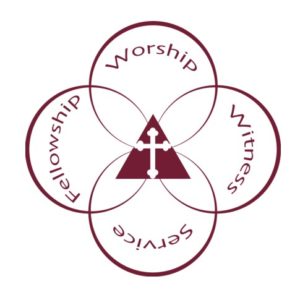It is recommended that the Youth Ministry Programs integrate the following elements into all aspects of their programming: worship, fellowship, service, and witness. An exceptional program will see these elements not as four separate entities, but as four interlocking circles that overlap and build on one another. A healthy young adult program keeps these aspects in balance.
Worship (Liturgia)
“Oh come, let us worship and bow down; Let us kneel before the Lord our Maker. For He is our God, And we are the people of His pasture, and the sheep of His hand.” Psalm 95:6-7
As Orthodox Christians, we believe that God reveals Himself through Holy Tradition and Scripture. Worship is the living expression of these, and is an important element in ministering to our young adults; they must remain active participants in the liturgical life of the Church.
Youth experience WORSHIP by:
- Actively participating in private and corporate prayer.
- Actively participating in the Divine Services and Sacraments of the Church (not only Liturgy, but the entire cycle of worship).
- Becoming familiar with different services of the Church and their role in the service (Paraklesis, Vespers, Compline, etc.).
- Praying for those who are sick or in need.
- Becoming familiar with prayers for morning, evening and different occasions, especially the book of Psalms.
- Observing the Church calendar, including the prescribed Feasts and Fasts.
- Learning the hymns of the Church and using them in prayer.
- Offering readings, chanting or participating in the choir.
- Reading the Bible and other religious writings.
Fellowship (Koinonia)
“Behold how good and pleasing it is when brothers dwell in unity.” Psalm 133:1
Fellowship is the way Orthodox Christians integrate their faith with daily life. It is sacred when Orthodox Christians gather together in our Lord’s name. The relationship of the Holy Trinity is the perfect model of Fellowship—the Father, Son, and Holy Spirit share perfect communion and exist in perfect love with each other. By gathering together in fellowship and experiencing this love, we emulate the relation- ship of the Trinity and develop our life in Christ.
Youth experience FELLOWSHIP by:
- Attending Church, youth gatherings, and other Church related activities.
- Participating in Church sponsored camps and retreat programs.
- Participating in Church sponsored athletic programs, ethnic dancing, etc.
- Participating in Inter-Orthodox activities.
- Watching films, videos, and multimedia presentations that can spark discussion.
- Watching performances of religious productions, musicals, etc.
- Participating in day or overnight outings together.
- Volunteering either at the parish or in the local community.
- Participating in group activities on various topics, books, movies, music, etc.
Service (Diakonia)
“For even the Son of Man did not come to be served, but to serve…” Mark 10:45
Christ came to serve, not to be served. Young adults are urged to do the same. They honor and glorify God by loving and serving humanity in His name, as an offering of good works. Young adults can use their God-given talent to serve. For Orthodox Christians, service to God and community is a way of life, a way of living one’s Faith. As Jesus Christ our Lord said, “Let your light so shine for men, that they may see your good works and glorify you Father in heaven” (Matthew 5:16). Service is an integral part of the Orthodox Christian’s life.
Too often, we look at our youth and wonder how we can help them. We need to inspire them toward a life of service. How can our youth use their God-given gifts in service to those in need and less fortunate? How can they be the people who respond to His call in Matthew 25:31-46, to feed the hungry, clothe the naked, visit those in prison. Responding to these human needs is the true meaning of service.
Youth experience SERVICE by:
- Offering their personal stewardship—giving of time, talents, and treasure—to both the church and local community charities.
- Participating in work projects to beautify and maintain the parish or local community.
- Outreaching to the elderly, the sick, the shut-ins, etc.
- Supporting and participating in missions abroad and at home.
- Supporting Archdiocesan, Metropolitan, and Parish ministries like Saint Basil Academy, Philoptochos, Hellenic College/Holy Cross, St. Michael’s Home, etc.
- Supporting Inter-Orthodox organizations endorsed by SCOBA, the Standing Conference of Canonical Orthodox Bishops in the Americas: International Orthodox Christian Charities (IOCC), Orthodox Christian Mission Center (OCMC), Orthodox Christian Fellowship (OCF), Eastern Orthodox Committee on Scouting (EOCS), Orthodox Christian Network (OCN), etc.
- Volunteering for a local soup kitchen or other community charities.
- Working with younger ministry groups in the parish or children in the local community.
Witness (Martyria)
“For you will be His witness to all men of what you have seen and heard.” Acts 22:15
Man is both a spiritual and physical being. Unfortunately this spiritual reality is not always expressed in the material world. In order to be true to oneself and to the Orthodox Christian Faith, young people should strive to exemplify the teaching of the Church. We are witnessing our faith when we live as Christ taught us to live, letting Christ shine in all that we do to those around us. This is the true meaning of witness.
Youth experience WITNESS by:
- Learning about Christ’s teachings and living them.
- Learning about the Saints’ great witness to the faith and imitating their example.
- Finding answers to questions they or others have about the faith.
- Making newcomers feel welcome.
- Inviting a non-Orthodox friend to a Church service or young adult event.
- Making the sign of the Cross before every meal—no matter where they are.
- Supporting and participating in mission work locally and abroad.
- Teaching children about the faith.
- Maintaining Christian integrity in all areas of their lives.
- Letting Christ’s love shine in all they do.
The Four Circles of Youth Ministry was taken from the Greek Orthodox Archdiocese of America Youth Ministry Guidelines.
